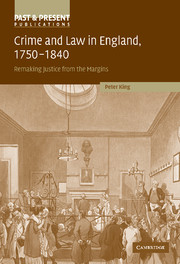Book contents
- Frontmatter
- Contents
- Preface
- List of figures
- List of tables
- 1 Shaping and remaking justice from the margins. The courts, the law and patterns of lawbreaking 1750–1840
- Part I Juveniles
- Part II Gender
- 5 Gender, crime and justice in late eighteenth- and early nineteenth-century England
- 6 Gender and recorded crime. The long-term impact of female offenders on prosecution rates across England and Wales 1750–1850
- Part III Non-lethal violence
- Part IV The attack on customary rights
- Index
- Past and Present Publications
5 - Gender, crime and justice in late eighteenth- and early nineteenth-century England
Published online by Cambridge University Press: 25 July 2009
- Frontmatter
- Contents
- Preface
- List of figures
- List of tables
- 1 Shaping and remaking justice from the margins. The courts, the law and patterns of lawbreaking 1750–1840
- Part I Juveniles
- Part II Gender
- 5 Gender, crime and justice in late eighteenth- and early nineteenth-century England
- 6 Gender and recorded crime. The long-term impact of female offenders on prosecution rates across England and Wales 1750–1850
- Part III Non-lethal violence
- Part IV The attack on customary rights
- Index
- Past and Present Publications
Summary
Current work on gender, crime and justice in eighteenth- and nineteenth-century England includes remarkably little research on the impact of gender at two of the fulcrum points of the criminal justice system — the verdicts and sentences passed by the major courts. The general texts on crime and punishment in this period give no clear indication about whether these decisions were affected by the sex of the accused, and even the recent books written by Conley and Zedner, which foreground gender issues, offer only occasional insights into the core question this paper is concerned with — to what extent did gender affect trial outcomes? Although his much quoted article on ‘The criminality of women in eighteenth-century England’ did not cover these issues, John Beattie's pathbreaking monograph Crime and the courts in England 1660–1800 does, however, provide a number of significant, if scattered, insights based on the Surrey evidence. The first section of this study follows Beattie's work in concentrating primarily on property crime and on the major courts, but it uses a much larger sample of over 11,000 cases and focuses on a different and shorter period by using selected years between the 1780s and the 1820s. The core data was collected directly from the records of the Old Bailey, which covered London and Middlesex, and from those of the Home Circuit, which covered Essex, Surrey, Sussex, Kent and Hertfordshire.
- Type
- Chapter
- Information
- Crime and Law in England, 1750–1840Remaking Justice from the Margins, pp. 165 - 195Publisher: Cambridge University PressPrint publication year: 2006



